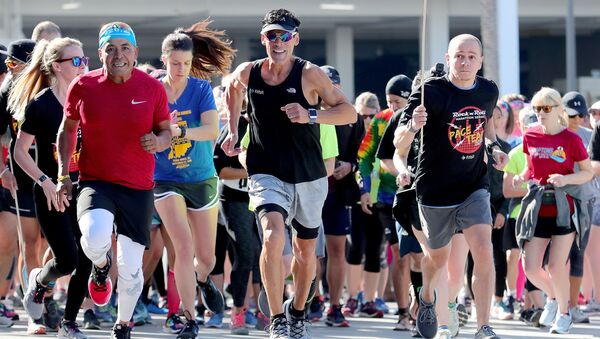Dean Karnazes is a world-renowned ultramarathon runner, whose accomplishments include running three hundred and fifty miles non-stop in eighty hours with no sleep, running a marathon in the South Pole, and winning a race across the US’s notorious Death Valley.
Dean Karnazes has given an insight into the mind-set of an ultramarathoner.
Sputnik: What inspired you to take up ultramarathon running?
Dean Karnazes: I used to love to run when I was a young boy, so I would remember running home from kindergarten when I was just five years old, and I ran competitively as a high school freshman, so when I was fourteen I was on the cross country team at our high school, and we won the state championship, and at that point I decided that running was boring.
I was a teenage kid, I was spending too much time running, I had better ways to spend my time, so I stopped running.
I was in a nightclub in San Francisco on my thirtieth birthday, doing what many people do on their thirtieth birthday, I was drinking with my mates, and I midnight I told them that I was leaving and they asked; “where are you going?” I said instead of having another shot of Tequila to celebrate my thirtieth birthday, “I’m going to run thirty miles right now”.
Always be quick with a laugh and a smile. It helps spread happiness (in a world that could use a little more). #SpartanUp pic.twitter.com/Hwoaysiypx
— DeanKarnazes (@DeanKarnazes) August 8, 2019
They looked at me and said “but you’re not a runner, you’re drunk”. And I said “I am drunk but I’m still going to do it”, so I walked out of a bar in San Francisco at midnight on my thirtieth birthday, and ran thirty miles that night, I ran straight through the night, and at that point after that drunken run I decided I was going to become an ultramarathon runner.
Sputnik: What advice would you give to people wanting to try it themselves?
Dean Karnazes: I would say that you need to train. There is no way you can fake your way through an ultramarathon, you have to pay your dues, so I would say that the best way to do it, is to start with what’s called a fifty kilometre race, which is thirty-one miles, and that’s pretty approachable as far as ultramarathons are concerned.
Start with a fifty-kilometre race and either find a coach, or just look online for a training plan for running an ultramarathon, and try to follow that plan, and then have a go.
The weekend is upon us. Get out!#FridayFeeling #getoutside pic.twitter.com/IcmXUNljNL
— DeanKarnazes (@DeanKarnazes) July 26, 2019
The best way to fuel for an ultramarathon is the best way that works for you. I always tell people that when it comes to nutrition; to listen to everyone, but follow no-one, I think the best way to go about it is to experiment during your training, so try different types of foods, different combinations during your long training runs and see how they work for you.
I know people that are Vegan that do just fine following a Vegan diet during an ultramarathon, personally I need protein, I was a Vegan for a while and I found that it couldn’t sustain me, so I changed, and I incorporate more protein into my diet, but things like peanut butter and almond nut butter, cashew butter, those are great fuels that are Vegan, or if you’re not a Vegan or Vegetarian, you can also eat those things.
Sputnik: Has ultra-marathon running taught you any lessons that have helped you in other areas of your life?
Dean Karnazes: There are many lessons that translate from ultramarathons into life, and a lot of them have to do with overcoming adversity, and dealing with obstacles.
During an ultramarathon you are faced with many obstacles, whether those be things like your shoes and socks wearing out prematurely, forgetting certain items when you show up at a race, as well as dealing with things like running for twenty-four hours nonstop, and having many highs and lows where you think you can’t go on, there’s no way that you can do this, and you’re somehow able to push through and actually do it, and succeed.
It teaches you that you are better than you think you are, and that you can go further than you think you can, and these lessons apply to business, to interpersonal relationships, to every element of life.
The views expressed in this article are solely those of Dean Karnazes and do not necessarily reflect the official position of Sputnik.

